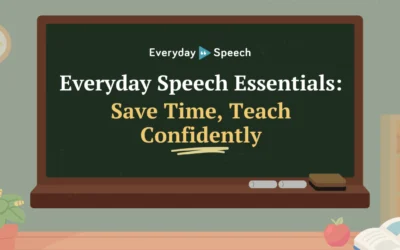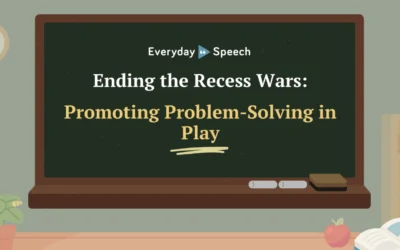Everyday Speech Blog
Social Skill Lesson Plans and Articles
Free Perspective-Taking Activities for Your Students [Download]
Five Strategies to Help Students Build Self-Regulation Skills
Helping students manage big feelings is no longer a side task in schools. It is central to their ability to learn and connect. From the morning bell to the last dismissal, teachers see every shade of emotion: excitement, anxiety, frustration, and joy. Students need...
Free Perspective-Taking Activities for Every Classroom
Perspective taking helps students recognize how someone else might think or feel, then use that insight to communicate, collaborate, and solve problems. This guide brings together classroom-tested perspective-taking activities you can use across grades and settings....
60+ Best Children’s Books for Social Skills
Teaching kids to read and write is important, but helping them build social skills like sharing, empathy, and problem-solving is what makes classrooms truly work. For many students, especially those in special education or receiving support through MTSS, these skills...
Everyday Speech Essentials: Save Time, Teach Confidently
Practical Strategies to Build Confidence, Connection, and Problem-Solving on the Playground
Recess should be the best part of the school day. But for many educators, it’s the moment they brace for impact. What should be 20 minutes of fun often spirals into tattling, tears, and playground “wars” that spill into the afternoon. If you’ve ever found yourself...
Ending the Recess Wars: Promoting Problem-Solving in Play
Free Activities for Academic Readiness [Download]
14 Back-to-School Activities for Listening, Respect, and Transitions
The start of the school year is full of excitement and change. New classrooms, new routines, and new relationships mean students need more than academic skills to succeed. They also need clear guidance on how to listen, follow directions, respect others, and move...
No-Prep Activities
Teaching Kindergarten Students to Stay Calm and Focused Amidst Distractions
Introduction As educators, we understand that our young students can easily get distracted, especially when their peers are not following the rules. Teaching them how to stay calm and focused in such situations is an essential skill to help them navigate their...
Changing the Channel on Strong Emotions: Strategies for Special Education Students
Introduction Strong emotions like anger, frustration, or sadness can fill our brain and freeze our decisions. When strong emotions take over, it can feel impossible to think about all our options and choose the right one. To make good decisions, we need positive...
Brain Breaks: Energizing and Relaxing Activities for Improved Focus
In today's fast-paced world, educators are constantly looking for ways to help students stay focused and engaged in the learning process. One effective strategy is to incorporate brain breaks into the classroom routine. These short activities can help students...
Teaching Problem-Solving Skills with the Solve It Game
Introduction Problem-solving is a crucial life skill that helps children navigate through various challenges they may encounter. The Solve It game is a fun and interactive way to teach elementary students how to tackle problems step by step. This game focuses on...
Encouraging an Open Mind in Kindergarten Students | Social-Emotional Learning
Introduction Change is a constant in school, especially for kindergarten students. They experience changes in schedules, teachers, activities, and locations. Helping students adapt to these changes is essential for their growth. One way to foster adaptability is by...
Teaching Special Education Students to Make Plans with Friends
Introduction Helping students in Special Education develop their social skills is a crucial aspect of their learning journey. One important skill that fosters better communication and collaboration is the ability to make plans with friends. This blog post will provide...
Developing Empathy: Understanding Others’ Feelings – A Guide for Educators
Introduction Empathy is a crucial skill for students to develop in order to build strong relationships and navigate social situations effectively. It involves understanding and sharing the emotions of others, even when we haven't experienced the same situation...
Teaching Flexibility vs. Rigidity to Kindergarten Students – A Fun & Engaging Activity
Introduction When working with Kindergarten students, it's essential to help them understand the difference between being rigid and being flexible. Being rigid means getting upset anytime plans change, while being flexible means we can adapt to changes without getting...
Collaborating with Co-Workers: Strategies for Special Education Educators
Introduction In the workplace, collaborating with co-workers is essential for success. This is true not only for the professionals but also for their students, who must learn how to work effectively with others. In special education settings, fostering teamwork and...
Teaching Middle School Students to Stay Calm and Solve Problems
Introduction Social-emotional learning is essential for middle school students, as it helps them develop healthy relationships and manage their emotions. One essential skill is learning to stay calm and address problems effectively. When students get upset, they can...
Helping Special Education Students Manage Stress: A No-Prep Activity
Introduction Stress management is an essential skill for students, especially those in special education. Educators play a crucial role in helping students develop strategies to handle stress and foster a positive learning environment. In this blog post, we will...
Teaching the Importance of Following Rules in Games for Kindergarten Students
Introduction Playing games is an essential part of childhood, and it provides an excellent opportunity for students to develop their social-emotional skills. One crucial aspect of playing games is understanding and following the rules. This blog post will explore the...
Teaching Students to Ask Friends to Play: A Guide for Special Education Educators
Introduction Asking friends to play is an essential social skill that students need to develop, especially in Special Education. This blog post will guide educators through an activity that requires no preparation, designed to help students practice asking friends to...
Teaching Adaptability and Flexibility: An Engaging No-Prep Activity for Educators
Introduction Adaptability and flexibility are essential skills for students to develop in order to navigate the ever-changing social landscape. As educators, it's our responsibility to help our students learn how to smoothly handle changes in plans and social...
Teaching Jealousy Control and Respect to Special Education Students
Introduction Jealousy is a common emotion experienced by individuals of all ages, including students in special education. It's essential to teach students how to control their feelings and actions when experiencing jealousy, as it can negatively impact their...


